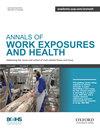60 Modular Exposure Models for OSH Risk Assessment in Chemical Safety – MEMORA
IF 1.8
4区 医学
Q3 PUBLIC, ENVIRONMENTAL & OCCUPATIONAL HEALTH
引用次数: 0
Abstract
Introduction European chemicals legislation aims to provide the best possible protection for workers when handling chemicals. The regulation of substances, mixtures and products is based on reliable risk assessments. This includes assessing workplace exposure to chemicals, which requires information on, e.g., the route of exposure (dermal/inhalation) and the level and duration of exposure. Methodology Exposure assessment requires the use of models, as workplace exposure data are often not available. The practical application of models as well as validation and comparative studies in recent years have led to the conclusion that further development of models is necessary. Key factors include a more user-friendly, transparent design of the tools and the addition of a dermal exposure module. Experiences from other BAuA projects (e.g., ETEAM and SysDEA) provide important insights for model-improvement. The MEMORA-project aims to develop a user-friendly toolbox covering both inhalation and dermal exposure assessment. Existing BAuA tools are examined and improved based on scientific findings, additional models will be included and a systematic tiered approach will be developed. Results/Conclusion During the workshop, 4 speakers will present the ongoing developments of different projects within the MEMORA-project-bundle. The aim is to develop solutions to questions that have arisen during the projects. Therefore, the presenters are interested in feedback from the participants to allow for possible adjustments to the chosen approaches. The workshop is intended to support the development of the toolbox in order to tailor it as much as possible to the needs of its users (practitioners, regulators, academics, etc.).60 化学安全中职业安全和健康风险评估的模块化暴露模型 - MEMORA
引言 欧洲化学品立法旨在为处理化学品的工人提供最佳保护。对物质、混合物和产品的监管以可靠的风险评估为基础。这包括评估工作场所接触化学品的情况,这需要提供有关信息,例如接触途径(皮肤/吸入)、接触程度和持续时间。方法 暴露评估需要使用模型,因为通常无法获得工作场所的暴露数据。近年来对模型的实际应用以及验证和比较研究得出的结论是,有必要进一步开发模型。关键因素包括工具的设计更加方便用户、更加透明,以及增加皮肤接触模块。其他 BAuA 项目(如 ETEAM 和 SysDEA)的经验为模型改进提供了重要启示。MEMORA 项目旨在开发一个用户友好型工具箱,涵盖吸入和皮肤暴露评估。将根据科学发现对现有的 BAuA 工具进行检查和改进,纳入更多的模型,并制定系统的分层方法。成果/结论 研讨会期间,4 位发言人将介绍 MEMORA 项目包内不同项目的进展情况。目的是为项目中出现的问题制定解决方案。因此,演讲者希望与会者提供反馈意见,以便对所选方法进行可能的调整。研讨会旨在支持工具箱的开发,以便尽可能满足用户(从业人员、监管人员、学者等)的需求。
本文章由计算机程序翻译,如有差异,请以英文原文为准。
求助全文
约1分钟内获得全文
求助全文
来源期刊

Annals Of Work Exposures and Health
Medicine-Public Health, Environmental and Occupational Health
CiteScore
4.60
自引率
19.20%
发文量
79
期刊介绍:
About the Journal
Annals of Work Exposures and Health is dedicated to presenting advances in exposure science supporting the recognition, quantification, and control of exposures at work, and epidemiological studies on their effects on human health and well-being. A key question we apply to submission is, "Is this paper going to help readers better understand, quantify, and control conditions at work that adversely or positively affect health and well-being?"
We are interested in high quality scientific research addressing:
the quantification of work exposures, including chemical, biological, physical, biomechanical, and psychosocial, and the elements of work organization giving rise to such exposures;
the relationship between these exposures and the acute and chronic health consequences for those exposed and their families and communities;
populations at special risk of work-related exposures including women, under-represented minorities, immigrants, and other vulnerable groups such as temporary, contingent and informal sector workers;
the effectiveness of interventions addressing exposure and risk including production technologies, work process engineering, and personal protective systems;
policies and management approaches to reduce risk and improve health and well-being among workers, their families or communities;
methodologies and mechanisms that underlie the quantification and/or control of exposure and risk.
There is heavy pressure on space in the journal, and the above interests mean that we do not usually publish papers that simply report local conditions without generalizable results. We are also unlikely to publish reports on human health and well-being without information on the work exposure characteristics giving rise to the effects. We particularly welcome contributions from scientists based in, or addressing conditions in, developing economies that fall within the above scope.
 求助内容:
求助内容: 应助结果提醒方式:
应助结果提醒方式:


